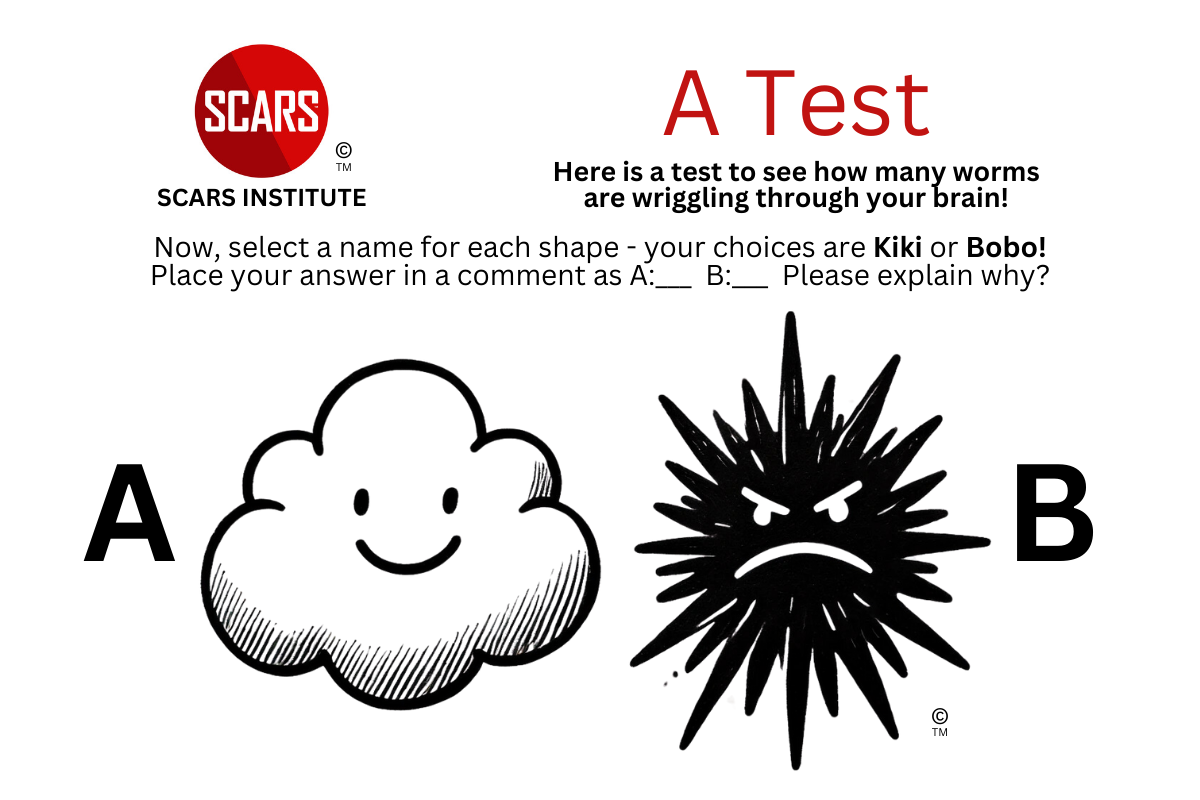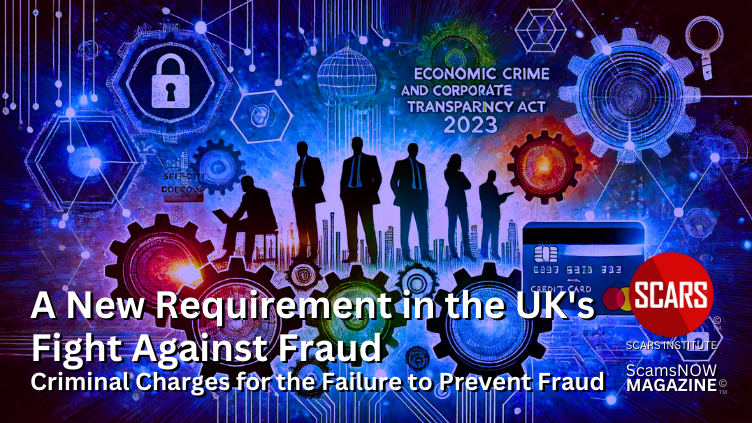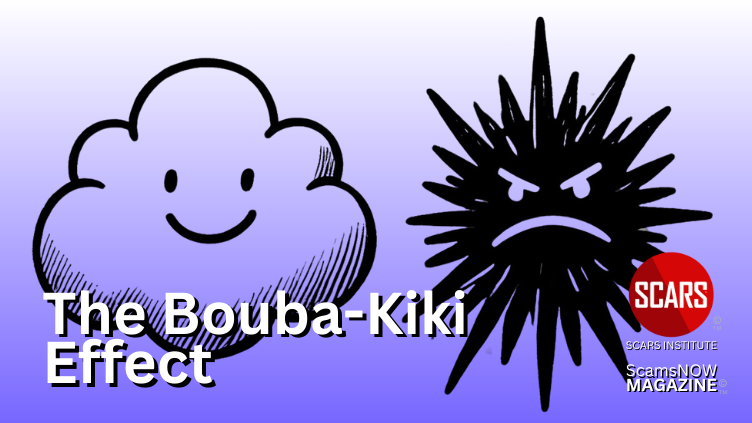The Bouba-Kiki Effect and the Psychology of Scam Victims
Subtitle
Primary Category: Psychology of Scams
Author:
• Tim McGuinness, Ph.D., DFin, MCPO, MAnth – Anthropologist, Scientist, Polymath, Director of the Society of Citizens Against Relationship Scams Inc.
About This Article
The Bouba-Kiki effect, a phenomenon where people instinctively associate certain sounds and shapes with specific emotions, offers insight into the subtle biases that can make individuals more vulnerable to scams. Scammers leverage this natural bias by using “soft” language, friendly tones, and comforting visuals, similar to the round, gentle sounds of “Bouba.”
These cues foster a false sense of safety and trust, often leading victims to let their guard down. Throughout the scam process, these associations shape how victims perceive the scammer’s intentions, respond emotionally, and overlook red flags. Even after discovering the scam, victims may struggle with cognitive dissonance as they try to reconcile their initial feelings of trust with the reality of betrayal.
By understanding these sensory biases and the ways scammers exploit them, victims can develop greater self-awareness and critical thinking skills, empowering them to recognize manipulation and protect themselves against future scams.

How the Bouba-Kiki Effect Influences Scam Victims’ Vulnerability: Understanding Sensory Biases in Manipulation
Introduction to the Bouba-Kiki Effect
The Bouba-Kiki effect, a phenomenon where people instinctively associate certain sounds with specific shapes, reveals much about how humans naturally connect sensory cues to emotions and meanings. While this effect may seem limited to sound and shape associations, it actually reflects a deeper psychological tendency to make quick judgments based on surface-level impressions. This natural bias can play a surprisingly significant role in online scams, where scammers skillfully manipulate language, tone, and visuals to create a comforting or familiar facade.
Scammers know that victims often respond to “soft” or friendly cues—much like how we associate a rounded shape with a warm-sounding word like “Bouba.” By capitalizing on these cognitive biases, scammers can create a false sense of safety, trust, and familiarity that lowers the victim’s defenses and influences their decisions. This article explores the connection between the Bouba-Kiki effect and scam vulnerability, analyzing how sensory biases shape victim assumptions before, during, and after the scam. Understanding this link can provide valuable insights for scam victims in recognizing manipulation tactics and rebuilding resilience.
The Bouba-Kiki Effect: An Overview
The association of the names “Bobo” and “Kiki” with distinct visual shapes—one soft and round (the cloud with a happy face) and the other sharp and angular (the spiky figure with a sad, angry face)—relates to what’s known as the Bouba-Kiki effect. This effect illustrates how people tend to assign sounds to shapes based on their characteristics, revealing a natural mapping between sounds and visual shapes that transcends language and culture. Here’s a deeper analysis of its psychological implications and what it reveals about cognitive processing and biases.
In the Bouba-Kiki experiment, originally conducted by Wolfgang Köhler in the 1920s and popularized in further research by V.S. Ramachandran and Edward Hubbard, participants are shown two shapes—one round and soft, and the other sharp and jagged. They are then asked to assign two names to these shapes, typically nonsensical names like “Bouba” and “Kiki.” Across different languages and cultures, people overwhelmingly assign the rounded shape to the softer name (“Bouba”) and the sharp shape to the sharper name (“Kiki”). This effect suggests that humans have an inherent, cross-modal correspondence between sounds and shapes, where certain sounds are more intuitively matched with certain visual forms.
Psychological Significance
Cross-Modal Correspondence
The Bouba-Kiki effect highlights the brain’s ability to find correspondences between different sensory modalities—in this case, sound and sight. “Bobo” (or “Bouba”) contains soft, rounded sounds due to its bilabial consonants (B sounds) and open, rounded vowels (O sounds). “Kiki,” on the other hand, uses sharp, high-frequency sounds with plosive consonants (K sounds), which have a sharp, “cutting” quality. This correspondence between the auditory qualities of the names and the visual shapes is an example of synesthetic-like mappings, where one sensory input (sound) naturally associates with another (visual form).
Implicit Cognitive Biases
The tendency to link rounded shapes with soft sounds and angular shapes with sharp sounds may reveal an implicit cognitive bias in human perception. This association suggests that certain sounds carry emotional or sensory qualities that our minds connect to visual characteristics. It is a form of cognitive shortcut, or heuristic, allowing us to quickly make associations based on limited information. This bias reflects our brain’s tendency to create symbolic connections that help simplify complex information and reinforce our understanding of the world.
Evolutionary Adaptation
From an evolutionary perspective, this correspondence could have survival value. Sharp, angular shapes are more likely to be associated with danger (like thorns, claws, or jagged rocks), while rounded, soft shapes are often safer or less threatening (like clouds or ripe fruits). The Bouba-Kiki effect might represent an evolved sensitivity to visual and auditory cues that helped early humans quickly assess environmental risks.
Emotional and Social Implications
The association of shapes with emotions also plays a role in social communication and emotional perception. Soft shapes and sounds (like Bobo or Bouba) tend to evoke feelings of comfort, safety, and friendliness. In contrast, sharp shapes and sounds (like Kiki) evoke alertness, caution, or even hostility. This association is likely reinforced by cultural factors, as certain sounds or shapes are consistently used in media and language to convey specific emotions or qualities. For example, in cartoons or brands, rounded shapes are often associated with positive, friendly characters, while angular shapes are often linked with villains or aggressive branding.
Cultural Universality and Cognitive Processing
The Bouba-Kiki effect is notable for its universality; studies show that people from diverse linguistic and cultural backgrounds tend to make the same associations. This universality suggests that the association is rooted in basic cognitive processing rather than cultural conditioning alone. Neurological studies indicate that areas of the brain responsible for language processing, auditory perception, and visual processing are interconnected, supporting this cross-modal mapping. Even young children and individuals who cannot read tend to exhibit the Bouba-Kiki effect, further indicating that it arises from innate cognitive wiring rather than learned behavior.
Linguistic and Naming Implications
The Bouba-Kiki effect has implications for language formation and the sounds we intuitively assign to words. In many languages, certain sounds are used consistently to convey specific meanings. For example, words that signify smallness or softness often contain high-pitched, round sounds (such as “baby” or “pillow”), while words related to harshness or sharpness use harder sounds (like “crash” or “knife”). This sound symbolism helps convey meaning quickly, even when encountering new words, by drawing on intuitive sound-shape associations.
This effect may also impact brand naming, where companies often choose names that align with their products’ intended emotional impact. A soft drink brand might choose a name with soft, rounded sounds (like “Coca-Cola”) to convey friendliness, while a sports car brand might opt for a name with hard consonants (like “Jaguar”) to convey speed and power.
Implications for Cognitive Bias Awareness
The Bouba-Kiki effect can remind us of how implicit biases shape our perceptions. Though harmless in the context of shapes and names, this tendency to form automatic associations based on limited sensory cues can influence our broader judgments. For example, we may be more likely to trust something labeled with “softer” language or interpret sharp, angular visuals as more aggressive or unfriendly. Being aware of such cognitive biases can improve critical thinking and help us understand why we might feel an intuitive aversion or attraction to certain stimuli based on seemingly unrelated sensory cues.
What the Bouba-Kiki Effect Tells Us About Human Cognition
The Bouba-Kiki effect is more than a quirky psychological phenomenon; it reveals core aspects of human cognition, including our ability to create cross-modal connections, our instinctive biases, and even our evolutionary adaptations. The tendency to link specific sounds to shapes demonstrates how our brains use cognitive shortcuts to interpret sensory information, which can affect our emotional and social responses. This effect shows how our perceptions are influenced by deep-seated biases, reminding us that our senses and language are intricately connected in ways that often go unnoticed. By recognizing these associations, we can better understand the subtleties of human perception and the power of sound symbolism in shaping our reactions and judgments.
Relationship Between the Bouba-Kiki Effect and the Assumptions that Scam Victims Make
A subtle but meaningful relationship exists between the Bouba-Kiki effect and the assumptions that scam victims make, particularly in how initial perceptions, emotional associations, and biases influence their decisions and judgments throughout the scam process.
While the Bouba-Kiki effect itself is primarily about sensory and linguistic associations, it sheds light on how people often make subconscious connections based on limited cues. In the context of scams, these intuitive associations can affect how victims interpret communication styles, evaluate risk, and respond emotionally, both before and after they realize they’ve been scammed.
Initial Judgments Based on Emotional Associations
The Bouba-Kiki effect illustrates how people instinctively associate certain sounds or forms with emotional or physical characteristics (e.g., soft sounds with gentleness, harsh sounds with aggression). In scams, a similar process occurs when victims encounter messages, voices, or profiles for the first time. Scam messages are often crafted to sound comforting, trustworthy, or safe, similar to a “Bobo” sound or rounded shape. Scammers avoid language or tones that might seem “spiky” or harsh, opting instead for friendly, warm words that are intended to foster trust. This aligns with the Bouba-Kiki principle that people are naturally drawn to softer, more inviting sounds and forms, which scammers exploit by creating a friendly and non-threatening presence.
For example, in romance scams, scammers may use soft and affectionate language that feels inherently comforting, playing on the natural inclination to associate certain words and tones with warmth and safety. Victims, influenced by this sensory-language association, may initially feel safe, lowering their guard before they have the chance to critically assess the situation.
Confirmation Bias and Cognitive Shortcuts During the Scam
Once an initial positive association is established, it can lead to confirmation bias, where the victim starts looking for signs that reinforce their belief that the scammer is trustworthy. The Bouba-Kiki effect shows how easily we make assumptions based on sensory impressions. Similarly, during a scam, victims often rely on cognitive shortcuts—such as “they sound sincere” or “they seem kind”—to make quick judgments, especially when the scammer’s language or appearance continues to feel “soft” and familiar. This mental shortcutting can prevent victims from recognizing red flags, as they subconsciously prefer to interpret each interaction as supportive or affectionate, even when it may objectively be questionable.
For instance, scammers may intentionally craft messages with warm language to invoke positive associations and repeat these patterns consistently. Victims, guided by their initial impression, often continue to interpret this messaging as sincere, thus failing to critically analyze the situation. This tendency to interpret words and interactions in line with initial associations creates a barrier to skepticism, which is exactly what scammers rely on to keep the deception going.
Emotional Associations and Cognitive Dissonance Post-Scam
After realizing they’ve been scammed, victims may experience cognitive dissonance, a mental discomfort that arises from holding conflicting beliefs, especially when reality doesn’t match prior assumptions. The Bouba-Kiki effect helps explain why victims often find it difficult to reconcile their initial feelings of trust and safety with the harsh reality of betrayal. Victims who initially felt safe, supported, or cared for may feel a heightened sense of betrayal because they trusted those warm, “Bobo-like” associations, only to find that they masked “spiky” intentions.
This realization often leaves victims questioning their own ability to judge people or situations, as the trust they placed in those friendly cues was ultimately misplaced. The contrast between the warmth of initial interactions and the cold reality of the scam can deepen feelings of self-doubt and vulnerability. Victims may even continue to seek explanations that align with their initial perceptions, holding onto the belief that perhaps it wasn’t all deception, which can make recovery even more challenging.
Manipulation of Sensory and Emotional Biases by Scammers
Scammers are highly skilled at exploiting sensory and emotional biases, similar to how the Bouba-Kiki effect taps into natural associations. They manipulate visual, auditory, and linguistic cues to create personas that feel comforting or familiar. For example, they may present fake profiles with warm smiles, soft lighting, or friendly language that feels inviting, mirroring the “Bobo” qualities people naturally associate with safety. Victims, responding to these sensory cues, may feel an instinctive attraction or trust toward the scammer, which can cloud their critical judgment.
Furthermore, scammers often avoid “sharp” or “spiky” language that could signal aggression or danger, as it could prompt victims to put up their defenses. This calculated use of “soft” signals is a deliberate tactic to lower suspicion and foster trust. Understanding this manipulation of sensory-emotional biases can help victims recognize how easily certain cues influence perceptions, making them more cautious in future interactions.
Implications for Recovery and Self-Awareness
Awareness of how natural sensory biases, like those illustrated by the Bouba-Kiki effect, can influence our decisions can be empowering for scam victims in recovery. Recognizing that it’s natural to make these associations can help victims understand that they weren’t “gullible” or “foolish” but simply responding to deeply ingrained cognitive patterns. This knowledge can also be a tool for strengthening their resilience, teaching them to look beyond surface-level impressions and seek out concrete, verifiable information before placing trust in the future.
For instance, victims may learn to question why they feel an instinctive sense of comfort or trust with someone and to critically analyze whether that feeling is based on real evidence or just intuitive associations. By becoming more aware of how they respond to certain cues, they can gradually build a stronger foundation of critical thinking, reducing their susceptibility to similar scams.
Bouba-Kiki Effect and Fake Names & Photos Used by Scammers
The Bouba-Kiki effect also relates to scam victims’ reactions to certain names or photos used by scammers, and it highlights how people instinctively respond to sensory and emotional cues, including sounds and visual characteristics. Scammers often exploit these subconscious associations by choosing names and photos that align with the “soft” and friendly qualities that many victims find comforting or trustworthy. Here’s how this relationship works in detail:
Names that Sound Soft or Trustworthy
Scammers may choose names that evoke warmth, trust, and friendliness, leveraging the Bouba-Kiki effect’s principle that certain sounds feel “safe” or approachable. Names with rounded, soft consonants (like “B,” “M,” or “L”) and open vowels (such as “O” or “A”) may create an impression of kindness and safety, much like the “Bouba” effect. For example, names like “Emma,” “David,” or “Molly” may be intuitively perceived as gentle or friendly, while names that sound harsh or angular (like “Kiki” in the Bouba-Kiki effect) are often avoided by scammers, as they may carry an implicit edge that feels less trustworthy.
This choice of name can have a powerful effect on potential victims by reducing initial skepticism and helping establish an early sense of trust. If a scammer uses a name that sounds warm and inviting, victims may feel an unconscious connection, especially if they’re already emotionally vulnerable or seeking companionship, making it easier for the scammer to break down barriers.
Photos that Align with Positive Visual Cues
In the Bouba-Kiki effect, rounded shapes are associated with softness, safety, and friendliness, while sharp shapes are linked to hostility or danger. Scammers frequently select profile photos that align with the “soft” visual characteristics, using images of people with gentle, smiling expressions, soft lighting, or friendly poses. These visual cues mirror the “Bouba” aesthetic—rounded, approachable, and non-threatening—aiming to create a sense of warmth and trustworthiness.
Photos with bright colors, warm lighting, and soft backgrounds can evoke a subconscious feeling of safety. Victims might not realize it, but they may feel drawn to profiles that appear friendly and warm due to these visual cues, while profiles that look sharp or dark may instinctively feel less safe. Scammers know this and use carefully curated photos to influence the victim’s initial impression and lower their defenses.
Emotional Reactions Based on Subconscious Associations
The Bouba-Kiki effect demonstrates how people make quick, intuitive associations between sounds, shapes, and emotions. This effect extends to names and images, influencing how scam victims emotionally respond to initial interactions. Scammers often use names and photos that evoke a sense of familiarity or warmth, aligning with the victim’s natural preference for “safe” and non-threatening associations. These associations help scammers bypass the victim’s critical thinking, creating an emotional reaction before the victim has fully processed the interaction.
For instance, a scammer using a friendly name and a photo with rounded, approachable facial features (such as a warm smile and relaxed posture) can elicit a feeling of comfort, subtly encouraging the victim to engage without suspicion. This type of emotional manipulation taps into the same intuitive biases as the Bouba-Kiki effect, which makes victims more likely to trust the scammer quickly, even before they have had a chance to evaluate the situation critically.
Reinforcement of Biases and Reduction of Skepticism
Once a scammer establishes initial trust through these associations, victims may fall into confirmation bias, where they look for signs that reinforce their positive perception. Much like in the Bouba-Kiki effect, where initial impressions of “soft” or “harsh” are strong and consistent, the early perception of friendliness and warmth in a scammer’s name or photo can set a tone that influences how the victim interprets all subsequent interactions. They may overlook warning signs or inconsistencies because they’ve already formed a mental image of the scammer as someone safe or caring.
Subtle Cues in Names and Photos
The Bouba-Kiki effect highlights how subtle cues in names and photos—such as soft sounds and warm, rounded visual features—can influence scam victims’ perceptions and emotional responses. Scammers use names and images that evoke trust and safety, tapping into these subconscious biases to lower victims’ defenses and create an emotional connection. Understanding how the Bouba-Kiki effect relates to these tactics can help individuals recognize their own intuitive biases, making them more cautious and aware when encountering new names or images online. This awareness can be a crucial step in resisting manipulative tactics and protecting oneself from scams.
Conclusion: The Bouba-Kiki Effect and Scam Vulnerability
While the Bouba-Kiki effect itself is primarily about associations between sounds and shapes, its underlying principle of intuitive, cross-modal associations can reveal why certain sensory cues make scam victims more vulnerable to manipulation. Scammers deliberately use comforting language, warm visuals, and friendly tones to create a facade of safety, knowing that victims are likely to respond positively to “soft” cues. By understanding how these cognitive biases operate, both in the context of scams and in broader sensory experiences, individuals can learn to navigate interactions with greater caution and discernment, ultimately strengthening their defenses against future scams.
Please Rate This Article
Please Leave Us Your Comment
Also, tell us of any topics we might have missed.
Leave a Reply
Thank you for your comment. You may receive an email to follow up. We never share your data with marketers.
-/ 30 /-
What do you think about this?
Please share your thoughts in a comment above!
A Note About Labeling!
We often use the term ‘scam victim’ in our articles, but this is a convenience to help those searching for information in search engines like Google. It is just a convenience and has no deeper meaning. If you have come through such an experience, YOU are a Survivor! It was not your fault. You are not alone! Axios!
-/ 30 /-
What do you think about this?
Please share your thoughts in a comment above!
ARTICLE RATING
TABLE OF CONTENTS
- Subtitle
- About This Article
- How the Bouba-Kiki Effect Influences Scam Victims’ Vulnerability: Understanding Sensory Biases in Manipulation
- Introduction to the Bouba-Kiki Effect
- The Bouba-Kiki Effect: An Overview
- Psychological Significance
- Cultural Universality and Cognitive Processing
- Linguistic and Naming Implications
- Implications for Cognitive Bias Awareness
- What the Bouba-Kiki Effect Tells Us About Human Cognition
- Relationship Between the Bouba-Kiki Effect and the Assumptions that Scam Victims Make
- Bouba-Kiki Effect and Fake Names & Photos Used by Scammers
- Conclusion: The Bouba-Kiki Effect and Scam Vulnerability
- A Note About Labeling!
- SCARS Institute™ ScamsNOW Magazine
Society of Citizens Against Relationship Scams Inc. [SCARS]
CATEGORIES
MOST POPULAR COMMENTED ARTICLES
POPULAR ARTICLES
U.S. & Canada Suicide Lifeline 988
![NavyLogo@4x-81[1]](https://scamsnow.com/wp-content/uploads/2025/04/NavyLogo@4x-811.png)
ARTICLE META
WHAT PEOPLE ARE TALKING ABOUT LATEST SITE COMMENTS
See Comments for this Article at the Bottom of the Page
on Aren’t We All The Same? Aren’t We All Just Meat-Robots? An essay on Humanity by Tim McGuinness, Ph.D. – 2025: “excelente!!! la claridad y la profundidad del análisis son realmente impresionantes. Me aportó mucho leerlo. totalmente de acuerdo entre la…” Jul 16, 11:17
on Savior Syndrome And The Negative Consequences To Them And Other Scam Victims – 2023: “We must heal ourselves before trying to help or heal others. It is easy to get caught up in the…” Jul 16, 11:13
on Anger & Self-Radicalization – Recovery Psychology 2023: “Anger can be useful but most often it is destructive on the individual, their family and friends. I like that…” Jul 16, 10:59
on Residual Fear In Scam Victims – 2024 [UPDATED 2025]: “Thank you for another fantastic SCARS article! I have felt some fear lately, that has caused me to feel tense…” Jul 16, 10:10
on Living in the Invisible Safety Bubble – 2025: “Enlightening, thought provoking, and another SCARS article that gives me pause. Recovery is a process and takes time. In a…” Jul 16, 07:46
on Living in the Invisible Safety Bubble – 2025: “We have too many kinds of scams in Japan. Recently, there are impersonation scam of “fake Cardinal account” gathering fraud…” Jul 16, 07:27
on Motte and Bailey – A Cognitive Pattern & Defense Mechanism that Inhibits Honest Acceptance – 2025: “Important information for reflection for any survivor : -to what extent the Motte & Bailey method is present / still…” Jul 16, 07:21
on Arts and Crafts Can Significantly Aid in Recovery for Scam Victims – 2025: “Right after the scam, I didn’t want to do anything. I felt defeated and ashamed—as if I had betrayed both…” Jul 16, 00:01
on The Fallacy of Fallacies & Living in the Real World – Error in Reasoning that Makes an Opinion Seem Valid – 2025: “I didn’t know about fallacies and cognitive biases until I enrolled in the Survivor’s School. When I learned about them,…” Jul 15, 23:40
on Motivational Denial – Recovery Psychology – 2023: “I agree with this article about some motivational material Looking at motivational material is not a totally bad thing but…” Jul 15, 12:25
on Living in the Invisible Safety Bubble – 2025: “I thought this was a brilliant article….lots to think about now.” Jul 15, 09:39
on Arts and Crafts Can Significantly Aid in Recovery for Scam Victims – 2025: “I did not realize that things I like doing very much—knitting or sudoku—were so helpful in my recovery process. The…” Jul 14, 11:28
on Projection And Scam Victims: “The moment I realized I had a financial loss due to a scam I realized that I felt shame, guilt,…” Jul 13, 19:12
on Japanese Legend of Tears – When There Are No Words – 2025: “After discovering the fraud, the pain was enormous. I shed oceans of tears, but I always tried to do it…” Jul 13, 10:50
on The SCARS Institute Scam Victim Recovery Timeline – 2025: “Wow. I umm experienced some of the later curves. I have been bouncing back and forth between asking myself why…” Jul 11, 00:01
on Transference And Emotional Danger After The Scam – 2024: “Thank you for the kind but firm reminder that the person in the stolen profile photo has their own life.…” Jul 9, 01:26
on ‘Mental Defeat’ – The Unique Condition Of Giving Up – 2024: “Thank you for another great article. I can see from this article that mental defeat would be debilitating to a…” Jul 9, 00:49
on Trust: Romance Scams Betrayal And Scam Victims – 2024: “This provided valuable insight that I can identify with” Jul 8, 16:44
on A Scam Victim in Extreme Distress – Stopping the Pain – 2024: “Your trust issues are very understandable. We are very sorry this happened to you. We suggest that you contact an…” Jul 8, 14:42
on A Scam Victim in Extreme Distress – Stopping the Pain – 2024: “My online counselors advised me to check myself in. I went to the hospital because I was suicidal. After I…” Jul 8, 13:44
Important Information for New Scam Victims
Please visit www.ScamVictimsSupport.org – a SCARS Website for New Scam Victims & Sextortion Victims
SCARS Institute now offers a free recovery program at www.SCARSeducation.org
Please visit www.ScamPsychology.org – to more fully understand the psychological concepts involved in scams and scam victim recovery
If you are looking for local trauma counselors, please visit counseling.AgainstScams.org
If you need to speak with someone now, you can dial 988 or find phone numbers for crisis hotlines all around the world here: www.opencounseling.com/suicide-hotlines
Statement About Victim Blaming
Some of our articles discuss various aspects of victims. This is both about better understanding victims (the science of victimology) and their behaviors and psychology. This helps us to educate victims/survivors about why these crimes happened and not to blame themselves, better develop recovery programs, and help victims avoid scams in the future. At times, this may sound like blaming the victim, but it does not blame scam victims; we are simply explaining the hows and whys of the experience victims have.
These articles, about the Psychology of Scams or Victim Psychology – meaning that all humans have psychological or cognitive characteristics in common that can either be exploited or work against us – help us all to understand the unique challenges victims face before, during, and after scams, fraud, or cybercrimes. These sometimes talk about some of the vulnerabilities the scammers exploit. Victims rarely have control of them or are even aware of them, until something like a scam happens, and then they can learn how their mind works and how to overcome these mechanisms.
Articles like these help victims and others understand these processes and how to help prevent them from being exploited again or to help them recover more easily by understanding their post-scam behaviors. Learn more about the Psychology of Scams at www.ScamPsychology.org
SCARS INSTITUTE RESOURCES:
If You Have Been Victimized By A Scam Or Cybercrime
♦ If you are a victim of scams, go to www.ScamVictimsSupport.org for real knowledge and help
♦ Enroll in SCARS Scam Survivor’s School now at www.SCARSeducation.org
♦ To report criminals, visit https://reporting.AgainstScams.org – we will NEVER give your data to money recovery companies like some do!
♦ Follow us and find our podcasts, webinars, and helpful videos on YouTube: https://www.youtube.com/@RomancescamsNowcom
♦ Learn about the Psychology of Scams at www.ScamPsychology.org
♦ Dig deeper into the reality of scams, fraud, and cybercrime at www.ScamsNOW.com and www.RomanceScamsNOW.com
♦ Scam Survivor’s Stories: www.ScamSurvivorStories.org
♦ For Scam Victim Advocates visit www.ScamVictimsAdvocates.org
♦ See more scammer photos on www.ScammerPhotos.com
You can also find the SCARS Institute on Facebook, Instagram, X, LinkedIn, and TruthSocial
Psychology Disclaimer:
All articles about psychology and the human brain on this website are for information & education only
The information provided in this and other SCARS articles are intended for educational and self-help purposes only and should not be construed as a substitute for professional therapy or counseling.
Note about Mindfulness: Mindfulness practices have the potential to create psychological distress for some individuals. Please consult a mental health professional or experienced meditation instructor for guidance should you encounter difficulties.
While any self-help techniques outlined herein may be beneficial for scam victims seeking to recover from their experience and move towards recovery, it is important to consult with a qualified mental health professional before initiating any course of action. Each individual’s experience and needs are unique, and what works for one person may not be suitable for another.
Additionally, any approach may not be appropriate for individuals with certain pre-existing mental health conditions or trauma histories. It is advisable to seek guidance from a licensed therapist or counselor who can provide personalized support, guidance, and treatment tailored to your specific needs.
If you are experiencing significant distress or emotional difficulties related to a scam or other traumatic event, please consult your doctor or mental health provider for appropriate care and support.
Also read our SCARS Institute Statement about Professional Care for Scam Victims – click here
If you are in crisis, feeling desperate, or in despair, please call 988 or your local crisis hotline.
More ScamsNOW.com Articles
A Question of Trust
At the SCARS Institute, we invite you to do your own research on the topics we speak about and publish. Our team investigates the subject being discussed, especially when it comes to understanding the scam victims-survivors’ experience. You can do Google searches, but in many cases, you will have to wade through scientific papers and studies. However, remember that biases and perspectives matter and influence the outcome. Regardless, we encourage you to explore these topics as thoroughly as you can for your own awareness.















![scars-institute[1]](https://scamsnow.com/wp-content/uploads/2025/04/scars-institute1.png)
![niprc1.png1_-150×1501-1[1]](https://scamsnow.com/wp-content/uploads/2025/04/niprc1.png1_-150x1501-11.webp)

This excellent article highlights the power of awareness, mindfulness and intuition as tools of discernment in our daily life. Bringing attention to the various human biases at work gives us a fighting chance of recognizing and preventing incoming scam.
Great, very informative article. The information on the Effect not only explains why we were so easy, quick to accept a scammer, but also what to pay attention to in order to be able to resist manipulative tactics, to protect ourselves from being scammed.